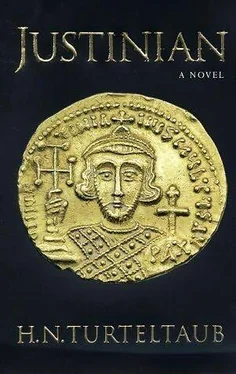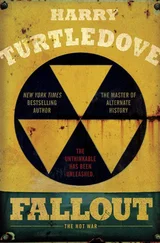Harry Turtledove - Justinian
Здесь есть возможность читать онлайн «Harry Turtledove - Justinian» весь текст электронной книги совершенно бесплатно (целиком полную версию без сокращений). В некоторых случаях можно слушать аудио, скачать через торрент в формате fb2 и присутствует краткое содержание. Жанр: Историческая проза, на английском языке. Описание произведения, (предисловие) а так же отзывы посетителей доступны на портале библиотеки ЛибКат.
- Название:Justinian
- Автор:
- Жанр:
- Год:неизвестен
- ISBN:нет данных
- Рейтинг книги:3 / 5. Голосов: 1
-
Избранное:Добавить в избранное
- Отзывы:
-
Ваша оценка:
- 60
- 1
- 2
- 3
- 4
- 5
Justinian: краткое содержание, описание и аннотация
Предлагаем к чтению аннотацию, описание, краткое содержание или предисловие (зависит от того, что написал сам автор книги «Justinian»). Если вы не нашли необходимую информацию о книге — напишите в комментариях, мы постараемся отыскать её.
Justinian — читать онлайн бесплатно полную книгу (весь текст) целиком
Ниже представлен текст книги, разбитый по страницам. Система сохранения места последней прочитанной страницы, позволяет с удобством читать онлайн бесплатно книгу «Justinian», без необходимости каждый раз заново искать на чём Вы остановились. Поставьте закладку, и сможете в любой момент перейти на страницу, на которой закончили чтение.
Интервал:
Закладка:
To distract them further, a large contingent of cavalry from the Anatolian military districts delivered a spirited attack against the eastern side of their wagon wall. If our men broke in there, well and good. If not, they would at least help distract the barbarians from the truly important point.
Distract them they did; through the gaps between wagons, we saw hide-clad barbarians carrying throwing spears and bows and arrows rushing toward what looked to be the most threatened area. At my signal, the excubitores advanced on foot against the barrier the Sklavenoi had thrown up, their shields protecting the relative handful of artisans who trundled along the carts that carried the liquid fire and the bellows and bronze tubes through which it was projected.
My greatest fear had been that the Sklavenoi would swarm out from their wagons and try to overwhelm the excubitores by weight of numbers. But we had cavalry on either wing to protect the imperial guards, and they, with their mailshirts, helms, and shields, and with their spears and swords, had to be foes to make unarmored barbarians think twice about engaging in close combat with them.
MYAKES
If Justinian was nervous, Brother Elpidios, I have to tell you I was about ten times worse than that. The Sklavenoi were screeching and shrieking louder than anything you can imagine. Boys- maybe girls, too, for all I know- kept running up and bringing them bundles of javelins and whole great sheaves of arrows.
I was in the front rank as we marched up to the wagons. That's what I got for being an officer, that and a fancier shield and a helmet with a tuft of red-dyed horsehair sticking up out of the top. So the Sklavenoi didn't want to kill me just on account of I was there, the way they did your ordinary excubitores. They especially wanted to kill me because I was close to 'em and I looked important. Lucky me.
By the time we got near enough their wagons for the clever lads with the liquid fire to do their work, my fancy shield had so many javelins and arrows stuck in it, it looked like it was practicing to be a hedgehog. One javelin hit me square in the chest, but my mailshirt- Mother of God, thank you- didn't let it through. And a couple of arrows clattered off my helmet, too.
Some good men weren't so lucky. My chum Anastasios, who'd eaten beans with me ever since I joined the imperial guards, took an arrow right in the eye. Like I told Justinian, not the worst way to go. He never knew what hit him, anyhow- that one would have killed him whether it was poisoned or not. And he was far from the only one who fell, too.
The biggest thing we had going for us was that the Sklavenoi didn't know-
What? Justinian says the same thing? All right, then, tell me what he says. He'll probably put it better than I could, anyway.
JUSTINIAN
Our greatest advantage, as I have said, was that the barbarians, being ignorant of the liquid fire, did not fully grasp why this body of foot soldiers was approaching the wooden rampart from which they were conducting their defense. Like the Achaeans when the warriors of Troy reached their beached ships, they aimed to keep fighting against us as fiercely as they could.
But we Romans had rather better incendiary tools at our disposal than our Trojan ancestors had known in that earlier age. A trumpet blared a command. The excubitores in the front rank stepped hastily to one side or the other, exposing the tubes and bellows and the men who worked them.
Eager as a small boy, I watched events unfold. Truly, I felt swept back to my own boyhood, having last seen liquid fire employed against a foe in the final year of the Arabs' siege of the imperial city. "Now!" I shouted to the military engineers. "Burn them now!"
They could not have heard me, not from so far away through the din of battle. And the Sklavenoi were showering them with missiles of every sort. Without the protection of the excubitores' shields along with their own, several of them were struck down in quick succession. But, having prepared for that case as well as every other, they brought up replacements and went on with their work.
Torchbearers sprang out in front of the mouth of each of the half-dozen bronze tubes aimed at the enemy. A javelin knocked one of them down, but a brave military engineer snatched up his torch in the nick of time and held it to the tube's mouth. Thus all six streams of flame were projected together against the wagons of the Sklavenoi.
Great, thick clouds of stinking black smoke rose from the streams of flame. The barbarians' shrieks of horror were as sweet as honey, sweet as wine, in my ears. I shouted with glee to watch some of the heathen Sklavenoi, caught in the fire, twist and writhe and burn, gaining for themselves in this world a tiny foretaste of the eternal flames of hell they would assuredly know in the next.
They were brave. Some of them, careless of our soldiers, rushed out between burning wagons to pour buckets of water on the liquid fire to try to douse it. But their efforts led only to fresh cries of dismay, for the Sklavenoi discovered, as had the followers of the false prophet before them, that the liquid fire continued merrily burning even though soaked with water.
We had at first set four wagons ablaze. God, in His kindness to us Christians, then granted that the breeze from the west, which had been fitful, began to blow more strongly. It carried flames and burning embers not only to the wagons close by those we had ignited, but also to the thatched roofs of the huts in the village the wagon circle had been made to protect. Along with the guttural shouts of Sklavinian men, the high, shrill cries of women and children came to my ears.
The fire reaching the huts, the battle was as good as won. While some of the Sklavenoi did continue trying to withstand us, others turned instead to fighting the fires, and still others, abandoning fight and fire both, ran for the shelter of the woods. Our soldiers were hunting them like partridges, having great sport. I let that go on for a short time, but then sent forth a new order: "If the barbarians wish to surrender, let them. The more captives we take, the more we can resettle in the empty lands of Anatolia." After a moment, I had another thought: "A pound of gold to the man who brings me Neboulos, the so-called kinglet here."
Because the village was burning, the Roman soldiers herded the prisoners into the fields nearby. They had to keep some of the Sklavinian women from slaying themselves because their husbands had been killed; officers familiar with the character of the Sklavenoi told me their women were more tender in this regard than those of any other people we know. Our men threw the corpses of those husbands- and of the women and children who died in the village- into a large pit they made some captives dig.
No one brought me Neboulos. I hoped he had fallen in the fighting and been burned beyond recognition but, on questioning Sklavenoi through men who knew their tongue, discovered no one who admitted having seen him go down. Disappointed, I concluded he might well have escaped as Sklavinian resistance crumbled.
Commanders were busy rewarding Roman soldiers who had fought well: some with promotions, some with money, and some with their pick of the Sklavinian women among the prisoners. One of the barbarians tried to keep his attractive wife from going off with the soldier who had chosen her for his enjoyment, and was promptly speared to death. The woman shrieked and wailed; the soldier led her away anyhow. As someone- as I write these words, I cannot remember who- said in the early days of Rome, "Woe to the conquered."
One of the prisoners, a yellow-haired woman of outstanding beauty despite a large smudge of soot on her cheek, struck my fancy. Approaching an officer who was making sure the Romans did not quarrel over their rewards, I asked, "May I be considered to have fought well?"
Читать дальшеИнтервал:
Закладка:
Похожие книги на «Justinian»
Представляем Вашему вниманию похожие книги на «Justinian» списком для выбора. Мы отобрали схожую по названию и смыслу литературу в надежде предоставить читателям больше вариантов отыскать новые, интересные, ещё непрочитанные произведения.
Обсуждение, отзывы о книге «Justinian» и просто собственные мнения читателей. Оставьте ваши комментарии, напишите, что Вы думаете о произведении, его смысле или главных героях. Укажите что конкретно понравилось, а что нет, и почему Вы так считаете.












